Let’s be honest. As a founder, you’re already the CEO, the head of sales, the janitor, and the person who remembers to buy coffee. Adding ‘HR Manager’ to that list sounds… awful. Hope you enjoy spending your afternoons fact-checking resumes and wrestling with payroll compliance, because that’s your new full-time job. Or, you could get smart and find the right software.
But the market is a jungle of jargon and shiny promises. I’ve been there, mortgaging the metaphorical ping-pong table for tools that ended up being glorified spreadsheets. That’s why we built this list. No marketing fluff. Just a straight-talking, opinionated guide to the actual best HR software for startups, based on what works, what breaks, and what will save your sanity when you’re trying to scale from 5 to 50 employees. This isn’t just about features; it’s about finding a system that won’t make you want to tear your hair out.
We’re diving deep into the tools that really move the needle for growing companies, from payroll and benefits to onboarding and global hiring. Beyond the initial setup, understanding market insights for managing people-related costs is crucial for a startup’s financial health and efficiency, and the right platform can provide that visibility. In this guide, we’ll break down the pros, cons, and ideal use cases for each option. You’ll get real screenshots, direct links, and candid advice to help you pick a partner, not just a product. Let’s get to it.
1. Async Interview
Async Interview is a game-changer for startups that need to hire fast without drowning their small HR teams in endless first-round calls. Let’s be honest, scheduling dozens of initial screening calls is a special kind of calendar hell. This platform scraps that entire mess by using asynchronous video interviews, letting you screen candidates 10x faster. It’s one of the best hr software for startups precisely because it solves the high-volume, low-resource problem that every growing company faces.
You set up the questions once, send out a link, and candidates record their answers on their own time. No more time-zone gymnastics or back-and-forth scheduling. For you, it means you can review 20 candidates in the time it would normally take to interview two or three.
Why It’s a Top Pick for Startups
This isn’t just about saving time; it’s about making smarter, more collaborative hiring decisions from the get-go. The AI-powered transcriptions are a standout feature, allowing you to quickly scan responses for keywords instead of watching every second of every video. You can easily share specific candidate answers with your team on Slack, get their feedback, and build a consensus without booking another meeting. This is how you avoid the “I had a good feeling” hire and focus on data.
The platform is also built to scale right alongside you. It supports unlimited users and jobs, so you’re not penalized for growth. As you build out your processes, you can dive deeper into its robust integration capabilities with tools like Zapier, Teamtailor, and Recruitee to create a powerful, automated hiring funnel. Async Interview provides more than just a tool; it delivers a strategic advantage in the war for talent. If you’re looking for more ways to streamline your hiring, you can explore the benefits of recruitment automation software.
Key Features & Strengths:
- Asynchronous Video Interviews: Eliminates scheduling conflicts and drastically speeds up the initial screening process.
- AI-Powered Transcription & Evaluation: Makes reviewing candidates faster and more objective, enabling data-driven collaboration.
- Seamless Integrations: Connects with your existing ATS and communication tools (Slack, Zapier, etc.) to automate workflows.
- Unlimited Scalability: No caps on users or job postings, making it perfect for high-growth startups planning to hire in bulk.
- Enterprise-Grade Security: Full GDPR compliance and top-tier security measures ensure candidate data is always protected.
Limitations to Consider:
- It’s hyper-focused on asynchronous interviews. If you need a robust, all-in-one solution for live video interviewing as well, you might need a supplementary tool.
- To truly unlock its power, expect to spend a little time setting up the branding customizations and integrations.
2. Rippling
Rippling isn’t just an HR platform; it’s a command center for your entire employee lifecycle. Think of it as the ultimate “new hire” button. You press it, and Rippling handles everything from sending the offer letter and running the background check to setting up their payroll, health insurance, work computer, and even their Slack account. It’s the kind of automation that gives a founder back their weekend.
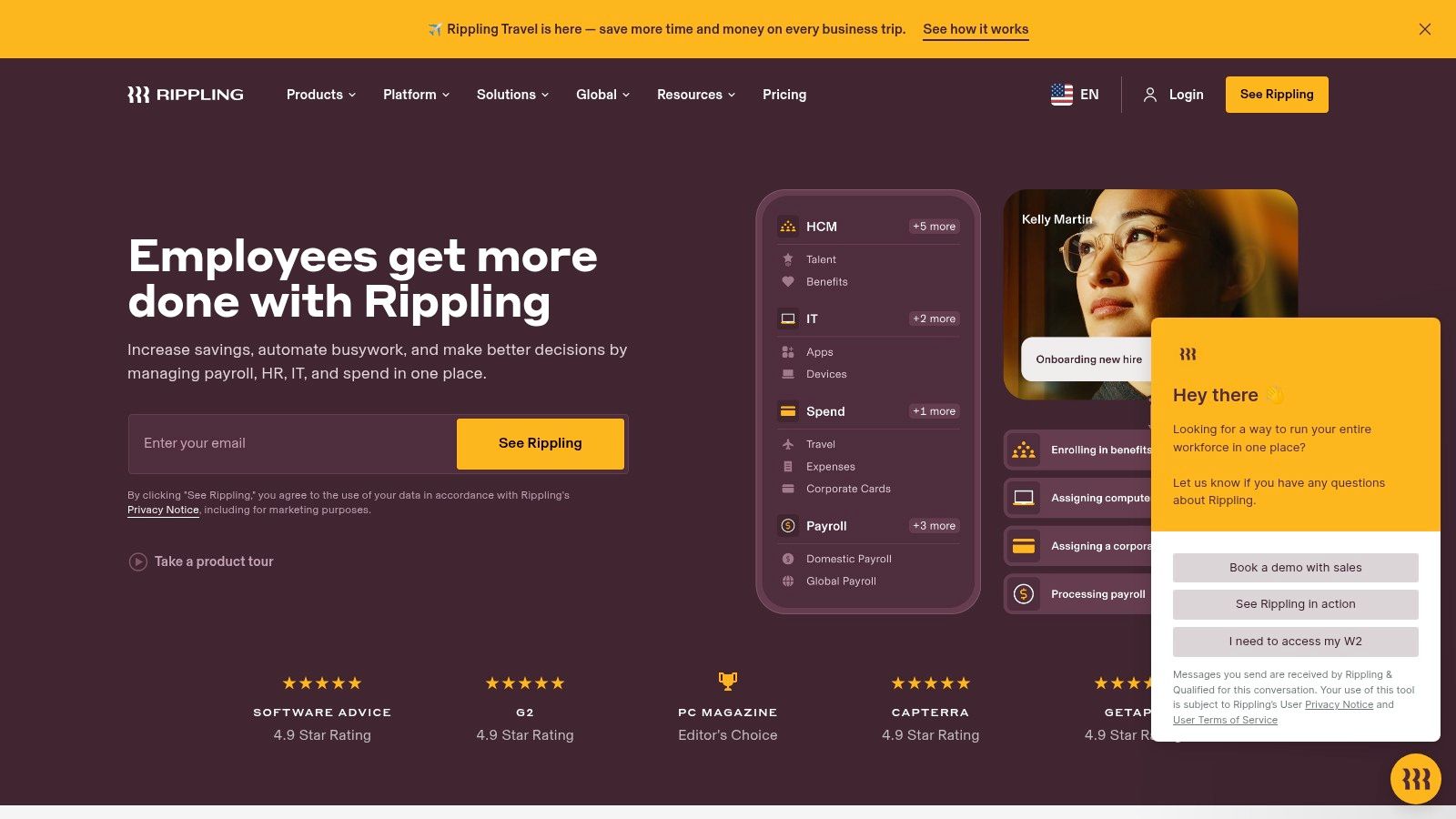
What makes Rippling one of the best HR software for startups is its unique integration of HR and IT. While other platforms stop at payroll, Rippling keeps going, provisioning and de-provisioning third-party apps and devices automatically. When an employee leaves, one click revokes access to everything, securing your company data instantly. This deep integration is a game-changer for scaling tech companies.
Key Details & Use Cases
- Best for: Tech startups that need to manage both people and their technology stack seamlessly. It’s ideal for fast-growing companies that want to automate onboarding and offboarding from day one.
- Standout Feature: The “Recipe” builder for workflow automation is ridiculously powerful. You can create custom, trigger-based workflows for almost any HR or IT event, like automatically ordering a monitor when an engineer is hired.
- Pricing: Starts at $8 per user, per month. However, pricing is quote-based and modular, so you’ll need to contact their sales team for a full estimate. Be prepared for base fees in addition to the per-user cost.
- Limitations: The modular pricing, while flexible, can become complex and more expensive than all-in-one bundles if you need many features. The sheer number of options can feel overwhelming during initial setup. The platform is truly at the forefront of the digital transformation in human resources, but it requires some investment to master.
Website: https://www.rippling.com
3. Gusto
If the thought of running your first payroll gives you cold sweats, Gusto is your lifeline. It was built from the ground up to make payroll, benefits, and basic HR so straightforward that even a first-time founder can’t mess it up. It’s less of an all-encompassing command center and more like the friendly, reliable HR manager you wish you could afford, handling the core compliance and payment tasks that keep your startup running smoothly.
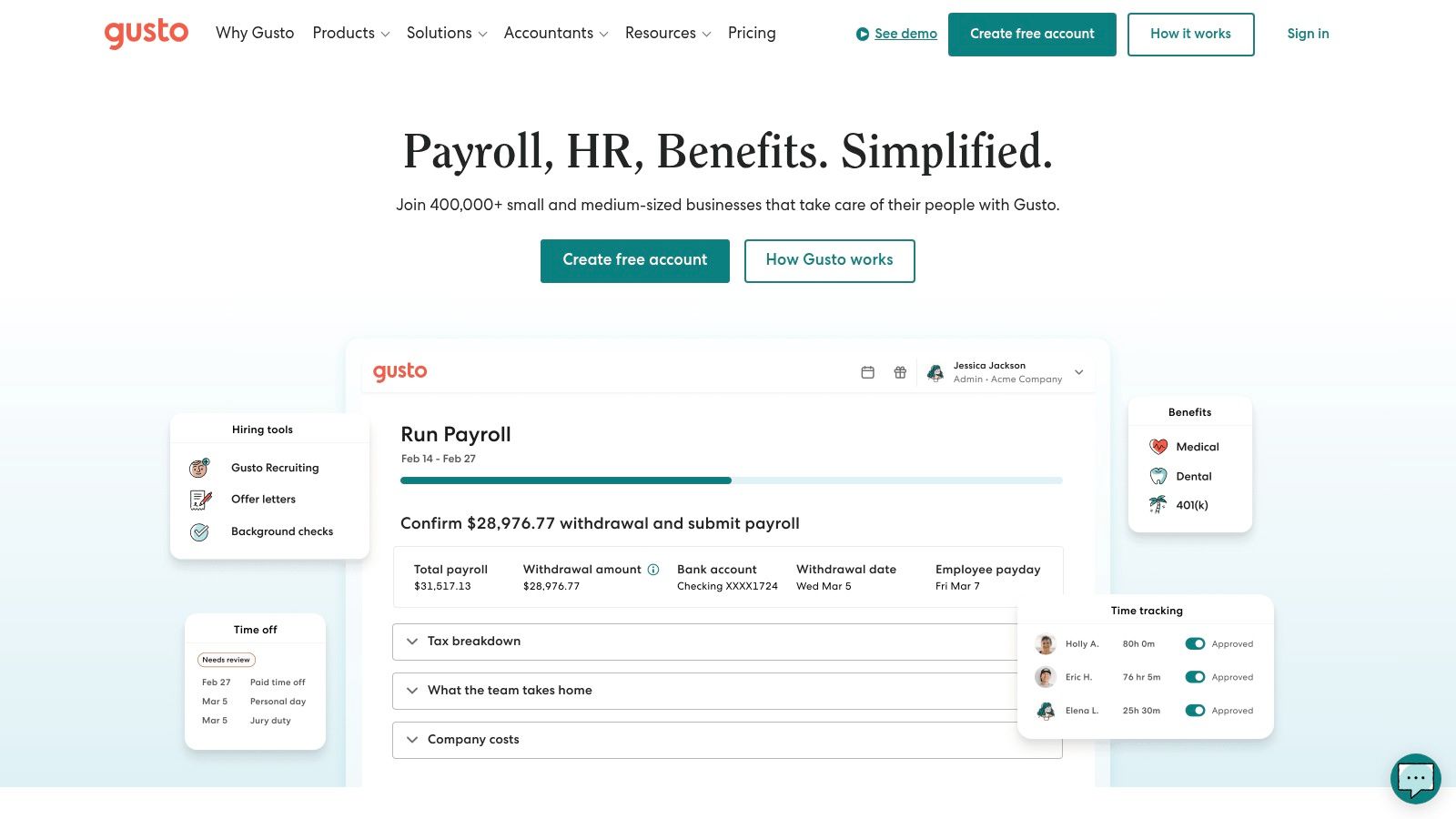
What makes Gusto one of the best HR software for startups is its radical transparency and simplicity. While others lure you into a sales call, Gusto lays out its pricing in plain sight, complete with a contractor-only plan for those early days. Its laser focus on payroll and benefits automation means you spend less time worrying about tax forms and more time actually building your company. It’s the perfect “get it done right” solution without overwhelming you with features you don’t need yet.
Key Details & Use Cases
- Best for: Early-stage startups and small businesses that need to nail payroll and benefits without a dedicated HR team. It’s especially great for companies hiring their first W-2 employees.
- Standout Feature: The employee self-service portal is fantastic. New hires can onboard themselves, view pay stubs, and manage their own details, which significantly cuts down on administrative back-and-forth. The automated tax filing is a lifesaver.
- Pricing: Simple tier pricing. The “Simple” plan starts at $40/month plus $6/user per month. Higher tiers add more advanced HR tools, multi-state payroll, and time tracking. They often have promotions for new customers.
- Limitations: While it handles the essentials beautifully, it’s not a full-suite HRIS. Advanced features like a robust applicant tracking system (ATS) or performance management are either basic or require higher-tier plans. The entry-level plan is also limited to single-state payroll.
Website: https://gusto.com
4. BambooHR
BambooHR is often the first “real” HR software a startup buys when it outgrows spreadsheets. It’s the sensible, friendly, and incredibly intuitive choice for organizing the chaos of a growing team. Think of it as the friendly HR manager you can’t afford to hire yet; it brings order to employee records, time-off requests, and onboarding checklists without a steep learning curve.
What makes BambooHR a consistent favorite among the best hr software for startups is its focus on the human side of human resources. While others chase complex automation, BambooHR perfects the core experience of managing people. Its interface is clean, approachable, and designed for HR generalists, not IT wizards. It’s less about building a complex tech stack and more about building a great company culture from a solid, organized foundation.
Key Details & Use Cases
- Best for: Startups graduating from “HR by Google Docs” to a formal system. It’s perfect for non-technical founders or first-time HR hires who need a reliable, all-in-one platform for core people operations.
- Standout Feature: The employee self-service portal is exceptionally well-designed. It empowers team members to update their own information, request time off, and access company documents, which genuinely saves managers from constant administrative headaches.
- Pricing: Entirely quote-based. You’ll have to talk to their sales team to get a number. Expect to pay for a core package and then add on modules like Payroll, Performance, and Time Tracking, which can increase the cost.
- Limitations: The modular pricing means crucial functions like payroll and performance management are not included in the base price, making the final cost less transparent. It lacks the deep IT automation of competitors like Rippling, focusing purely on the HR side of the house.
Website: https://www.bamboohr.com
5. Deel
Deel is your passport to building a global team without drowning in international compliance paperwork. It’s built for the remote-first era, letting you hire and pay contractors or full-time employees almost anywhere on the planet. Forget about setting up foreign entities or navigating complex tax laws; Deel handles the messy backend so you can focus on finding the best talent, regardless of their zip code.
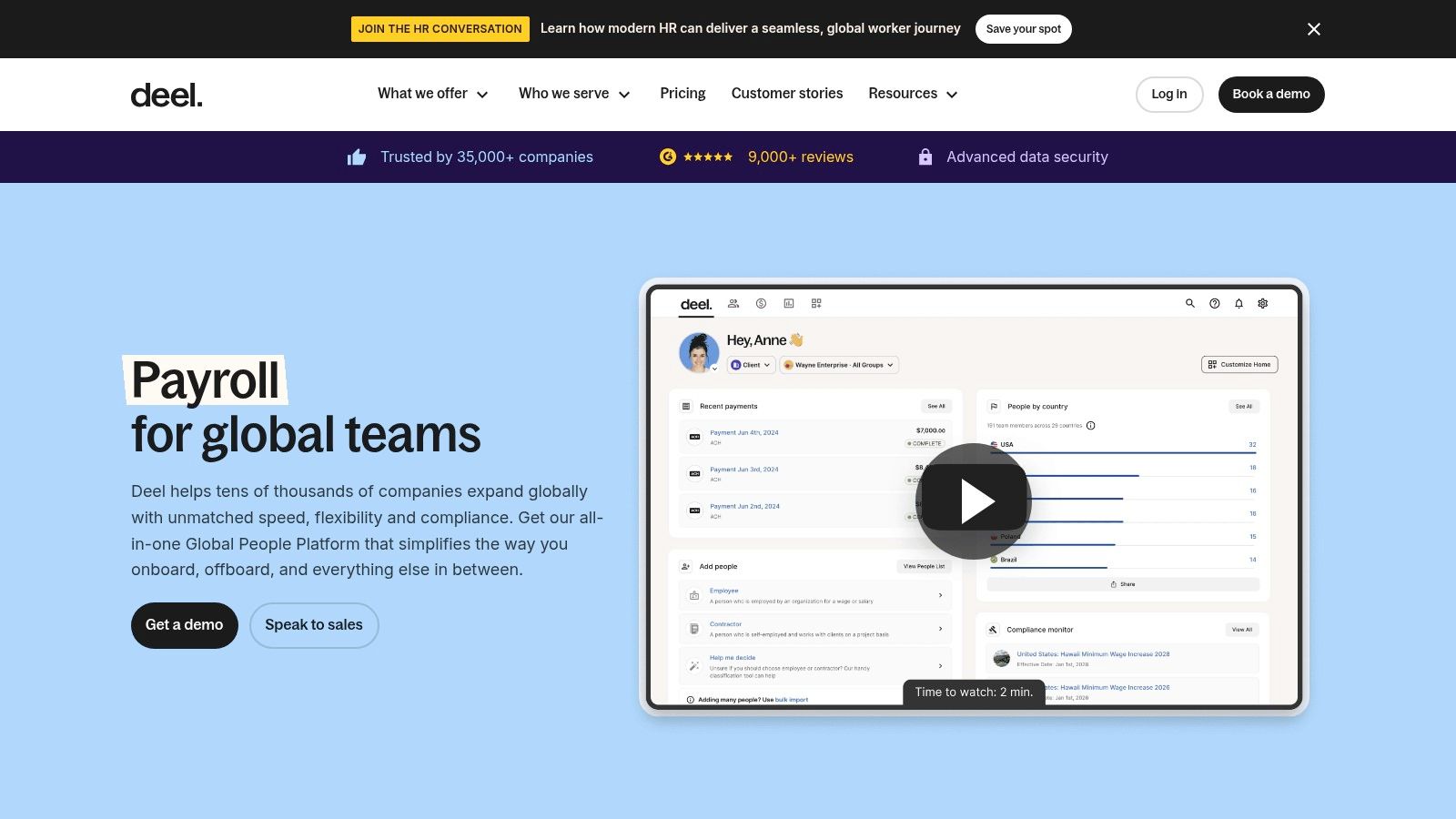
What makes Deel a top contender for the best HR software for startups is its powerful Employer of Record (EOR) service. This means Deel legally employs your international team members on your behalf, ensuring full compliance with local labor laws, benefits, and payroll. It consolidates a tangled web of global HR functions into a single, clean dashboard, making it one of the simplest ways to scale a distributed workforce from day one.
Key Details & Use Cases
- Best for: Remote-first startups and companies looking to hire international talent without establishing legal entities abroad. It’s a lifesaver for managing a mix of contractors and full-time global employees.
- Standout Feature: The all-in-one global compliance engine. Deel generates locally compliant contracts, manages payroll in 120+ currencies, and handles benefits administration, taking the legal guesswork out of global hiring.
- Pricing: Contractor management starts at $49 per person, per month. EOR services begin at $599 per person, per month. Pricing is transparent and listed on their site, which is a breath of fresh air.
- Limitations: The EOR service can get pricey as you scale your full-time international team. For startups that only hire within the US, Deel’s powerful global features might be overkill and less cost-effective than a domestic-focused PEO. For startups leveraging platforms like Deel for international hiring, it’s also crucial to stay informed about any new requirements for visa interviews.
Website: https://www.deel.com
6. TriNet HR Platform (formerly Zenefits)
TriNet HR Platform, which you might remember as Zenefits, is the à la carte menu of the HR software world. Instead of forcing you into an all-or-nothing suite, it lets you pick your core plan and then add on what you need, when you need it. This is perfect for startups that want solid HR fundamentals without paying for bells and whistles they won’t use for another two years. It’s a pragmatic, “HR first” approach for founders who know exactly where their immediate pain points are.
The platform excels at the foundational stuff: onboarding, time-off tracking, and org charts are clean and intuitive. Where it really stands apart is its transparent, tiered packaging. You can see what you’re getting and what it costs, then bolt on payroll or advisory services as you grow. This flexibility makes it one of the best HR software for startups that want control over their spending while still building a professional HR infrastructure.
Key Details & Use Cases
- Best for: Early-stage startups that need a strong, foundational HR system with the flexibility to add services like payroll later. Ideal for founders who prefer a clear, build-your-own pricing model.
- Standout Feature: The clear, tiered pricing structure (Essentials, Growth, Zen) with a public-facing calculator is a breath of fresh air. It lets you model costs without a mandatory sales call, which is a huge time-saver.
- Pricing: Plans start at $8 per employee, per month for the Essentials plan. Payroll is an additional $6 per employee, per month. Be aware that implementation fees may apply, especially for larger teams.
- Limitations: The rebrand from Zenefits to TriNet HR Platform can be a bit confusing. While the core product is solid, it lacks the deep IT automation of competitors like Rippling, focusing squarely on people operations.
Website: https://www.trinet.com/solutions/hr-plus/hr-platform/pricing
7. HiBob (Bob)
If your startup operates more like a global community than a company confined to a single office, HiBob is built for you. It’s less of a rigid HR database and more of a vibrant, culture-centric platform designed for modern, distributed teams. Think of it as the social glue that keeps your remote and in-office employees connected, engaged, and aligned, no matter where they are.
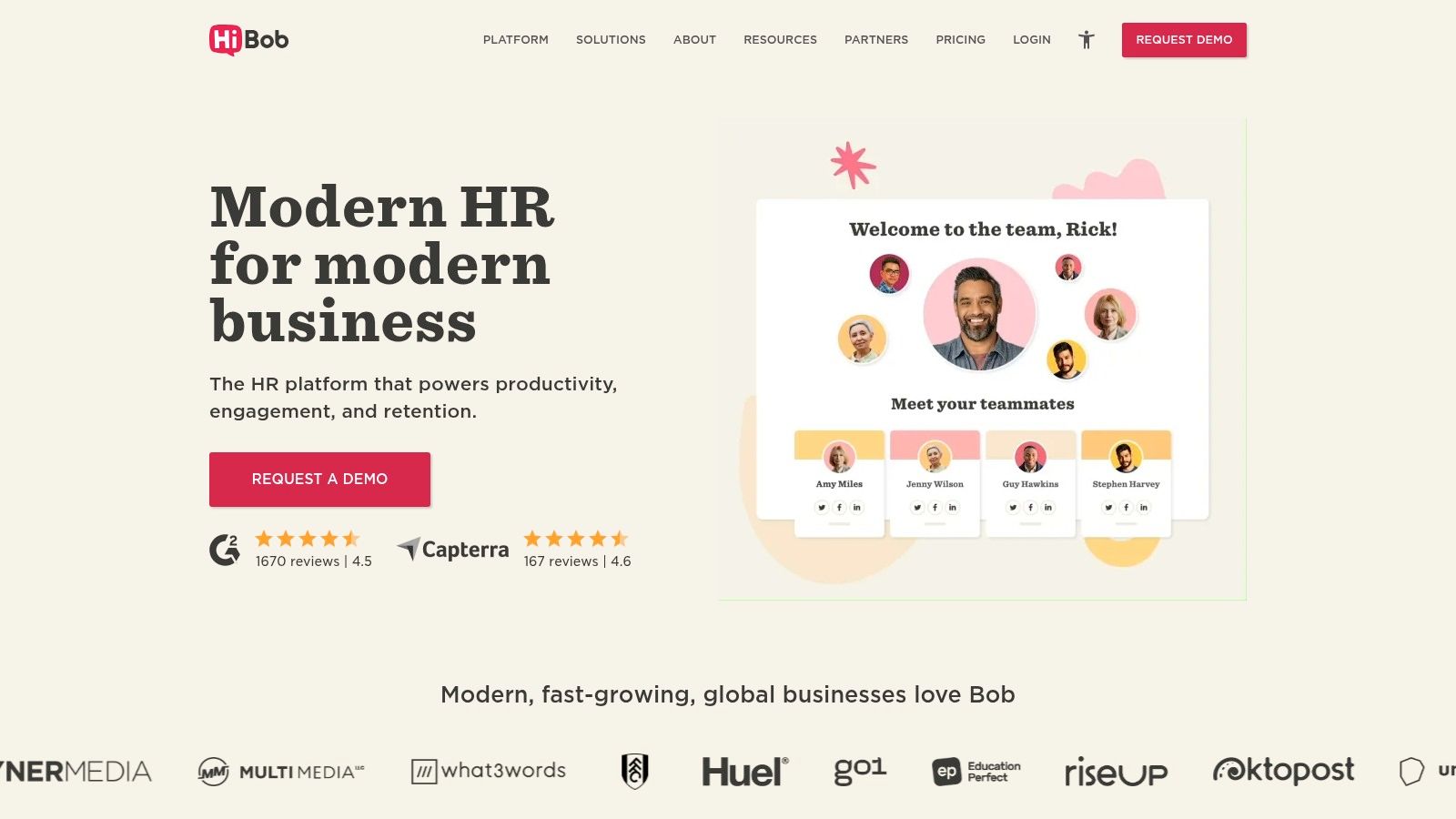
What makes HiBob a contender for the best HR software for startups is its intense focus on the employee experience. While other platforms treat people like entries in a spreadsheet, Bob uses features like “Clubs” (for interest groups), “Shoutouts,” and a dynamic org chart to foster a sense of belonging. It’s designed to scale your culture right alongside your headcount, which is a massive challenge for fast-growing companies.
Key Details & Use Cases
- Best for: Multinational startups and modern, mid-sized companies that prioritize culture and employee engagement across different countries. It’s a great fit for businesses that have outgrown basic HR tools.
- Standout Feature: The platform’s approach to global localization is exceptional. It effortlessly handles multiple currencies, public holiday calendars, and compliance needs for different regions, making international expansion far less painful.
- Pricing: Pricing is entirely custom and quote-based. You’ll need to contact their sales team for a demo and a tailored proposal based on your specific headcount and required modules.
- Limitations: Native payroll isn’t its core strength; it relies heavily on third-party integrations, which can add complexity and cost. For startups needing a simple, all-in-one payroll and HR solution, this might not be the most direct route. Its strong focus on engagement tools also means its performance management best practices are robust, but might be overkill for very small teams.
Website: https://www.hibob.com
8. Justworks
Justworks takes a different approach by acting as a Professional Employer Organization (PEO). This means they don’t just sell you software; they become your co-employer, taking on the legal burden of payroll, compliance, and benefits administration. For a founder who dreads deciphering state tax laws or negotiating benefits packages, Justworks is like hiring an entire HR department without clearing out a corner of the office.
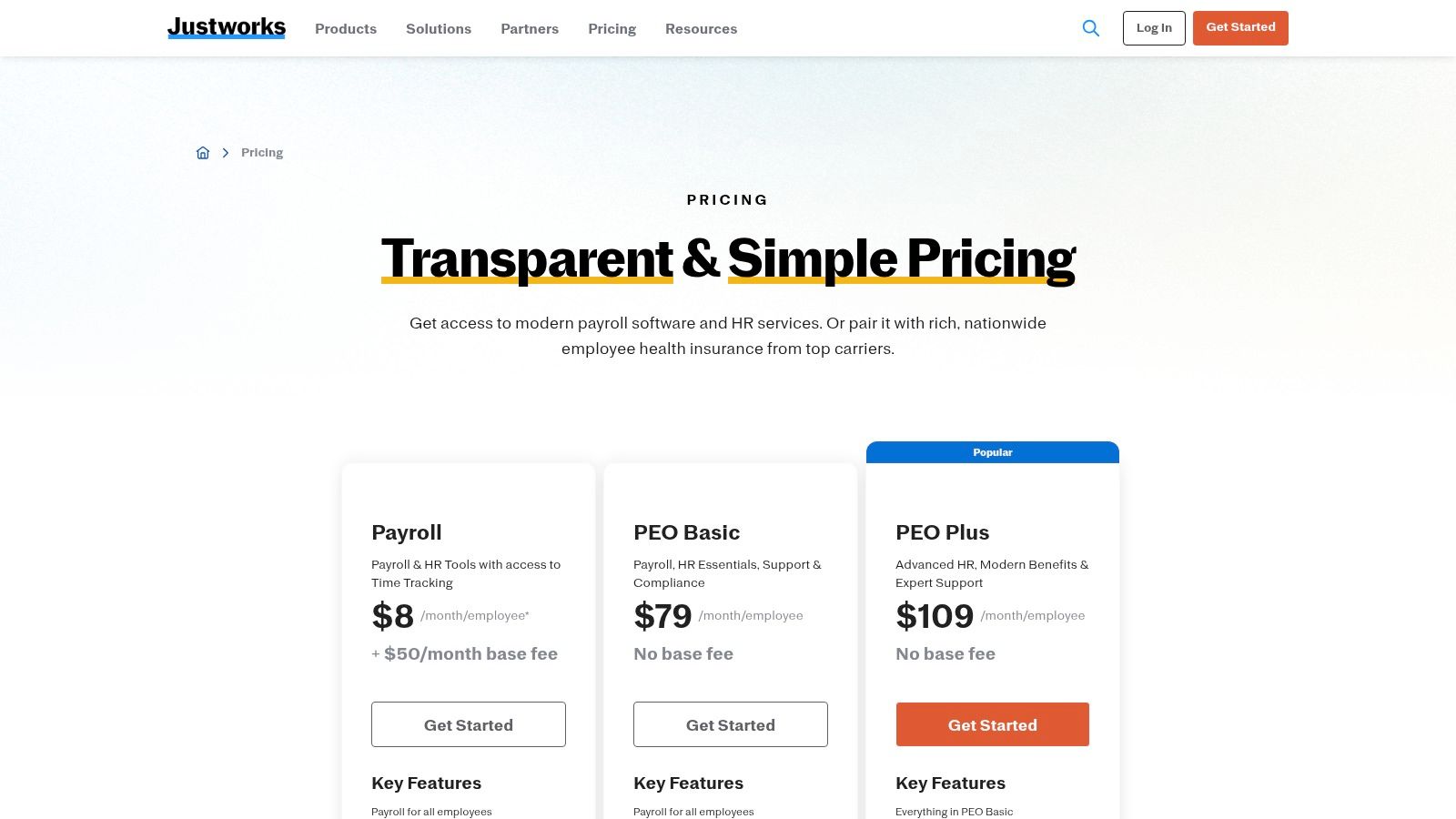
What makes Justworks a strong contender for the best HR software for startups is its ability to give tiny teams access to big-company benefits. By pooling all its clients together, it can offer premium health, dental, and vision plans at rates a 10-person startup could never get on its own. It’s a powerful hiring and retention tool that levels the playing field against larger, more established competitors.
Key Details & Use Cases
- Best for: US-based startups that want to completely offload HR administration and compliance. It’s ideal for founders who want to offer premium benefits from day one without becoming benefits experts themselves.
- Standout Feature: Access to large-group benefits is the main event. It allows you to offer competitive packages that punch well above your startup’s weight class, backed by 24/7 support for you and your employees.
- Pricing: Transparent pricing starts at $59 per month, per employee for the Basic plan and $99 for the Plus plan (which includes benefits access). Prices decrease as your team grows.
- Limitations: The PEO model isn’t for everyone; it’s a deeper commitment than a standard SaaS platform and may be overkill for very early-stage teams. Also, benefits plan availability and carriers can vary significantly depending on your state.
Website: https://www.justworks.com/pricing
9. RUN Powered by ADP (Small Business Payroll)
When you just need payroll to work, no questions asked, you go with the name everyone knows. RUN Powered by ADP is the small business arm of the undisputed heavyweight champion of payroll. It’s less about flashy startup perks and more about the quiet confidence that comes from knowing your taxes are filed correctly and your team will be paid on time, every time. It’s the responsible, grown-up choice.
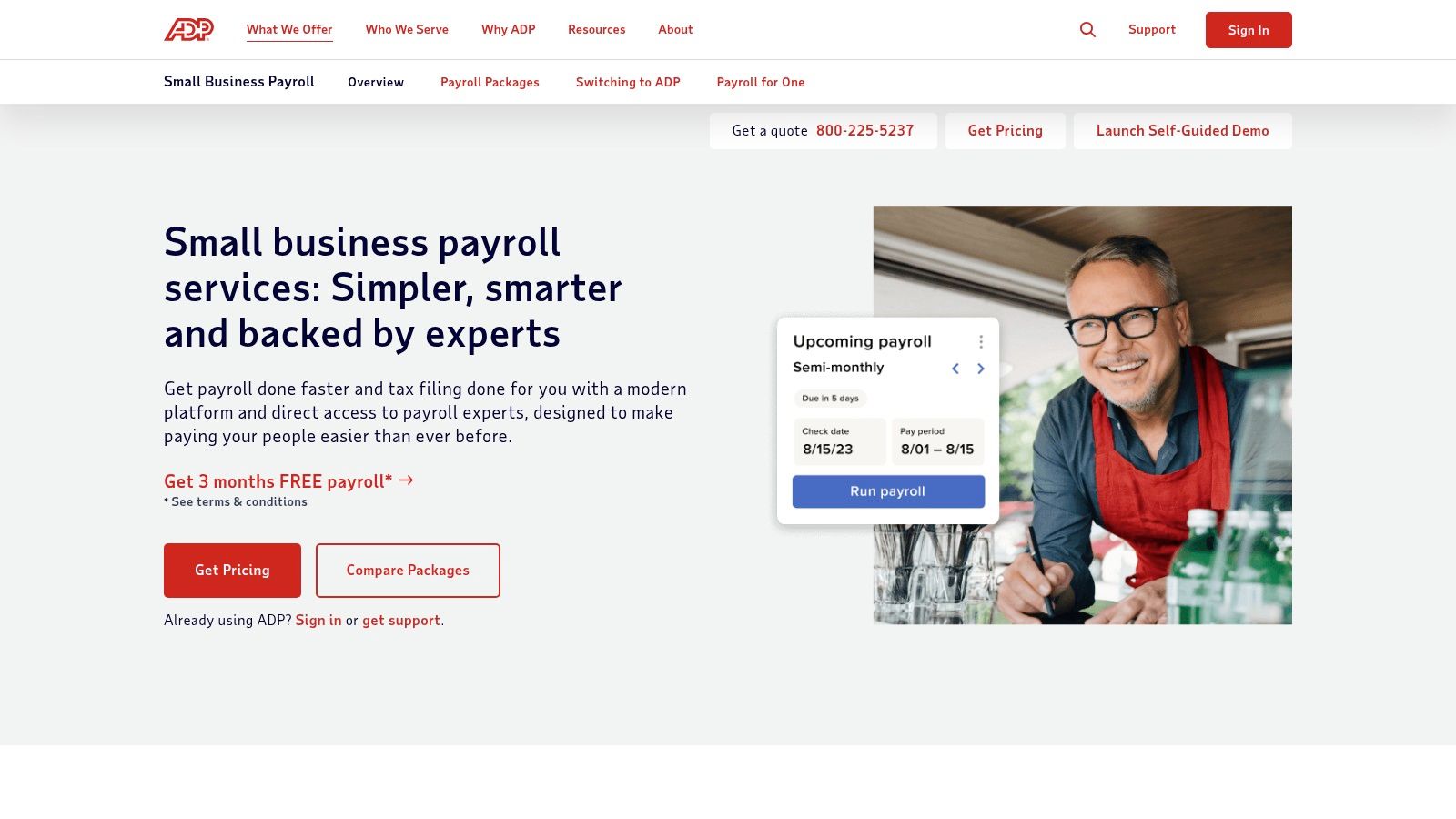
What makes ADP a contender for the best HR software for startups is its unparalleled compliance infrastructure. While other platforms are still figuring out multi-state tax laws, ADP has been doing it for decades. Its AI-powered features, like the Payroll Inspector, act as a safety net, flagging potential errors before you hit “submit.” It’s less of a Silicon Valley disruptor and more of a battle-tested engine you can trust as you scale.
Key Details & Use Cases
- Best for: Startups that prioritize payroll accuracy and tax compliance above all else. It’s a rock-solid choice for founders who operate in multiple states and want to eliminate any risk of costly compliance mistakes.
- Standout Feature: The deep, almost intimidating, expertise in compliance. ADP handles federal, state, and local tax filings automatically, and its live HR support (in higher tiers) provides genuine expertise when you need it.
- Pricing: Quote-based. You’ll have to talk to a sales rep to get a price, and packages range from essential payroll to comprehensive HR Pro plans. Expect a setup fee and be prepared to negotiate.
- Limitations: The user interface can feel a bit corporate and less intuitive than modern, startup-focused platforms. The pricing isn’t transparent, and the add-on structure can feel like you’re being upsold. It’s powerful, but not always the most user-friendly experience.
Website: https://www.adp.com/en/what-we-offer/payroll/payroll-for-1-49-employees.aspx
10. Oyster
Oyster is your passport to building a global team without the soul-crushing complexity of international law. It’s an Employer of Record (EOR) platform designed for startups that think beyond borders from day one. If you’ve ever found the perfect candidate only to realize they live in a country where you have no legal entity, Oyster is the solution that prevents you from saying, “It’s not you, it’s the international tax code.”
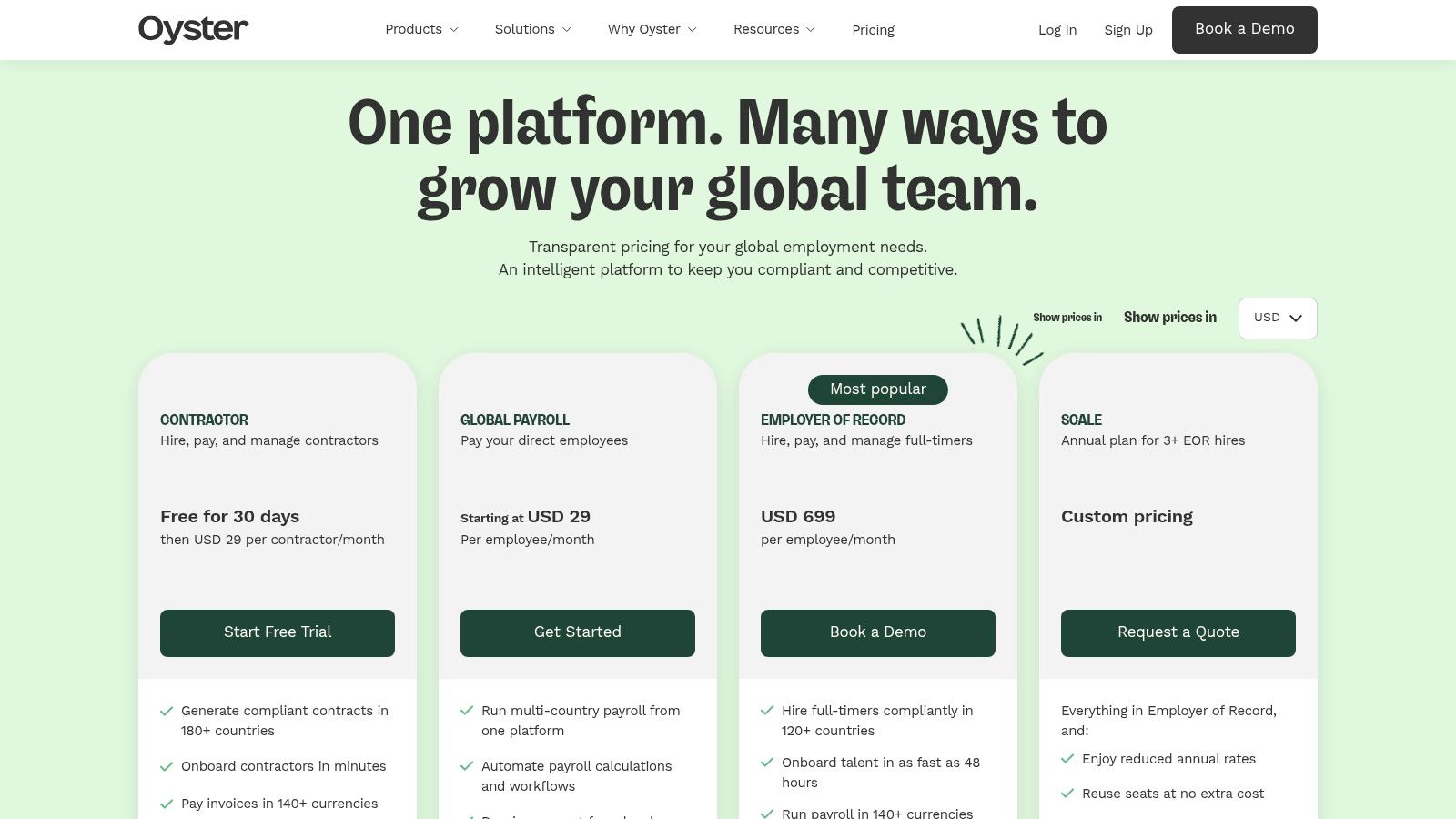
What makes Oyster a top contender for the best HR software for startups is its transparency and focus on making global hiring accessible. It handles the nitty-gritty of local compliance, payroll, and benefits in over 130 countries, so you can hire talent anywhere as easily as you hire someone down the street. It’s a powerful alternative to competitors like Deel, particularly for founders who value straightforward pricing and robust contractor management tools from the get-go.
Key Details & Use Cases
- Best for: Remote-first startups and distributed companies that need to hire, pay, and manage employees or contractors in multiple countries legally and efficiently.
- Standout Feature: The platform’s transparent pricing model is a breath of fresh air. You can see the costs for EOR and contractor services directly on their website, which helps with budgeting and avoids surprise fees.
- Pricing: Contractor management starts free for up to 2 contractors. Full-time employee hiring (EOR) starts at $399 per employee per month for the Business plan (with a $10,000 security deposit requirement) or $699 per employee per month for the Scale plan with no deposit.
- Limitations: The value is almost exclusively for companies with international team members; it’s overkill for a domestic-only startup. Be mindful of potential foreign exchange fees and the security deposit required for the more affordable EOR plan.
Website: https://www.oysterhr.com/pricing
11. G2 HR Software Category (comparison marketplace)
Sometimes the best tool isn’t a single platform, but a map to the entire treasure chest. G2 is the definitive software marketplace where you can compare HR tools based on brutally honest, verified user reviews. Think of it as Yelp for B2B software, saving you from the agony of endless sales demos by showing you what real users actually think. It’s your secret weapon for cutting through marketing fluff.
What makes G2 essential when searching for the best HR software for startups is its powerful filtering. You can instantly narrow down the field to tools specifically praised by other small businesses, compare feature sets side-by-side, and see which platforms are trending up or down. Instead of taking a vendor’s word for it, you get crowd-sourced intelligence from people who have already walked the path you’re on.
Key Details & Use Cases
- Best for: Founders and HR leads in the research phase who want to create a data-backed shortlist of potential HR software. It’s perfect for validating vendor claims before committing to a demo.
- Standout Feature: The “Grid” report, which visually plots platforms based on user satisfaction and market presence. It’s an incredibly fast way to see who the true leaders, contenders, and niche players are in any given category.
- Pricing: Free to use for research and comparisons. G2 makes its money from vendors who pay for premium profiles and lead generation, not from you.
- Limitations: Be aware of sponsored placements. While reviews are verified, the platforms that appear at the very top of a list may have paid for that visibility. Always cross-reference with the organic rankings on the Grid.
Website: https://www.g2.com/categories/hr-management-suites
12. Capterra HR Software for Small Businesses (comparison marketplace)
Sometimes the best tool isn’t a single platform but a map to find the right one. Capterra is your starting point when the sheer number of HR software options feels like a high-stakes guessing game. It’s less of a tool and more of a strategic resource, a marketplace where you can compare, filter, and read user reviews before you commit to a demo and a hard sell from a sales rep. Think of it as window shopping for your company’s operational backbone.
For a founder drowning in options, Capterra’s small-business filter is a lifesaver. It cuts through the noise of enterprise-grade systems that would require you to mortgage the office ping-pong table. Instead, it surfaces relevant tools, often with pricing indicators and aggregated pros and cons from people who have actually used them. This initial research is crucial for finding the best HR software for startups without wasting weeks on pointless demos.
Key Details & Use Cases
- Best for: Founders and early-stage HR leads at the very beginning of their search. It’s the perfect first step to build a shortlist of potential HR software vendors that fit your specific needs and budget.
- Standout Feature: The robust filtering and side-by-side comparison tool is invaluable. You can quickly narrow down the field based on features like “payroll” or “performance management” and see how top contenders stack up against each other based on real user ratings.
- Pricing: The site is free to use. Pricing for the listed software varies, but Capterra often provides starting price points, saving you from a surprise during a sales call.
- Limitations: Be aware that some listings are sponsored, so they might get preferential placement. Additionally, pricing and feature details can sometimes be outdated if a vendor updates their plans, so always verify information directly with the software company.
Website: https://www.capterra.com/human-resource-software/s/small-businesses/
Top 12 HR Software for Startups: Feature & Pricing Comparison
| Software | Core Features / Characteristics | User Experience / Quality ★ | Value Proposition 💰 | Target Audience 👥 | Unique Selling Points ✨ | Price Points 💰 |
|---|---|---|---|---|---|---|
| Async Interview 🏆 | Asynchronous video interviews, AI transcription, unlimited users/jobs, integrations (Zapier, Slack, Teamtailor, Recruitee) | ★★★★★ Reliable, fast global servers, 24/7 support | Free trial & affordable scalable plans, no surprises | HR managers, recruitment agencies, bulk hiring teams | AI-powered evaluation, customizable branding/layout, enterprise security, GDPR compliant | Free trial, scalable pricing |
| Rippling | Workforce platform: payroll, benefits, IT provisioning, 600+ integrations | ★★★★ Strong automation, modular approach | Custom quote; modular pricing | Startups, growing companies | Deep workflow automation, modular add-ons | Quote-based |
| Gusto | Payroll, benefits, hiring, time tracking, ATS in higher tiers | ★★★★ Clear plans, good compliance automation | Transparent, tiered pricing | Small teams, first-time employers | Contractor-only option, frequent promotions | Transparent, tiered plans |
| BambooHR | HRIS with onboarding, performance, payroll (add-ons) | ★★★★ Clean UI, broad integrations | Quote-based, add-ons for payroll/performance | SMBs, startups formalizing HR | User-friendly UI, extensive marketplace integrations | Quote-based |
| Deel | Global employment: EOR, payroll, contractor payments | ★★★★ Strong international compliance | Transparent pricing on key products | Remote-first startups, global teams | Employer of Record in 150+ countries | Transparent pricing |
| TriNet HR Platform | Core HR, analytics, payroll (optional), benefits | ★★★★ Tiered packages, online pricing calculator | Flexible add-ons, advisory & recruiting options | Startups needing flexible HR | Payroll add-ons, benefits via TriNet broker | Tiered pricing |
| HiBob (Bob) | Core HR, onboarding, performance, global integrations | ★★★★ Modern UI, scalable globally | Custom quote pricing | Fast-growing, distributed teams | Strong engagement tools, multi-country support | Quote-based |
| Justworks | PEO with payroll, compliance, benefits | ★★★★ Transparent per-employee pricing | Simplicity & strong compliance | Small teams, founders offloading HR | 24/7 support, bundled benefits | Per employee pricing |
| RUN Powered by ADP | Payroll with tax filing, AI-assisted workflows | ★★★★ Trusted brand, deep compliance | Quote-based pricing | Small businesses | AI payroll features, scalable across states | Quote-based |
| Oyster | Global hiring, payroll, EOR, contractor management | ★★★★ Clear published pricing | Transparent EOR & contractor fees | Distributed startups | Salary insights, visa sponsorship options | Published pricing |
| G2 HR Software (Marketplace) | HR software rankings, reviews, comparisons | ★★★★ Large database, verified reviews | Free access to software comparisons | SMBs, startups | Up-to-date rankings, easy vendor access | Free |
| Capterra HR Software | Review site with small business focus, pricing insights | ★★★★ SMB-focused, quick pricing signals | Free access to vendor lists and reviews | SMBs, budget-conscious buyers | Small business orientation, aggregated pros/cons | Free |
The Final Verdict: So, Which One Do You Actually Pick?
Alright, let’s land this plane. We’ve torn apart a dozen platforms, from all-in-one behemoths to specialized hiring tools. If you’ve scrolled this far, you know there’s no single, magical piece of software that solves every startup headache. Anyone who tells you otherwise is probably trying to sell you something with a terrible user interface.
The real “best hr software for startups” is the one that solves your most painful problem right now, without locking you into a five-year contract you’ll regret. Your goal isn’t to find the perfect system; it’s to find the right-fit system for this chapter of your company’s life.
Let’s Be Brutally Honest About Your Needs
Choosing HR software is like hiring your first Head of People. You need to be ruthlessly pragmatic about what you can afford and what skills are non-negotiable. Don’t get distracted by shiny features you won’t touch for another 18 months.
Here’s a simple, no-fluff breakdown to guide your final decision:
- For the “We Just Need to Pay People” Crew (US-Based):
If your biggest fear is messing up payroll taxes and you’re based in the US, stop overthinking it. Gusto and Justworks are your champions. They are built for this exact scenario: making sure your small but growing team gets paid correctly and has access to solid benefits, without requiring you to have a Ph.D. in compliance. - For the “We’re Scaling and It’s Getting Messy” Crowd:
You’re past the “five friends in a garage” stage. You need more than just payroll; you need onboarding workflows, time-off tracking, and a central place for employee data. This is where BambooHR and HiBob (Bob) shine. They offer a more robust HRIS experience that feels like a genuine upgrade, helping you build foundational HR processes that will scale with you. - For the Ambitious “Unify Everything” Tech Startup:
If you live and breathe efficiency and want a single command center to manage not just people but also their devices and apps, Rippling is in a league of its own. It’s an operations powerhouse disguised as an HR platform. The ability to onboard a new engineer and have their laptop, Slack, and GitHub access provisioned automatically is a game-changer for fast-moving tech companies. - For the “Our Team is Everywhere” Global Pioneers:
Hiring internationally is no longer a luxury; for many startups, it’s a core strategy. Don’t even try to navigate global compliance and payroll on your own. This is precisely what Deel and Oyster were built for. They are non-negotiable if you plan to hire contractors or full-time employees across different countries from day one. They handle the complexity so you can focus on finding the best talent, wherever it is.
Final Considerations Before You Sign
Before you pull the trigger, remember this: implementation matters. A powerful tool with a clumsy rollout is just another expensive problem. Ask about the onboarding process. Will they migrate your data? Is there a dedicated support person who will answer your panicked emails at 9 PM on a Tuesday?
And please, run a demo that mirrors your actual workflow. Don’t just watch a sales rep click through a perfect, pre-packaged presentation. Insist on seeing how you would actually onboard a new hire, run an off-cycle payroll, or pull a report on employee turnover. The small frictions you notice in a demo will become massive roadblocks in your day-to-day.
Ultimately, the goal is to buy back your time and sanity. Choose the tool that feels less like a chore and more like a capable partner, freeing you up to focus on the truly human part of HR: building an incredible team and an amazing place to work.
Tired of sifting through hundreds of resumes just to find a few qualified candidates? Async Interview helps you automate the top of your hiring funnel with one-way video interviews, so you can screen more applicants in less time and focus your energy on the people who matter. Stop scheduling endless screening calls and start making better, faster hiring decisions today by visiting Async Interview.




